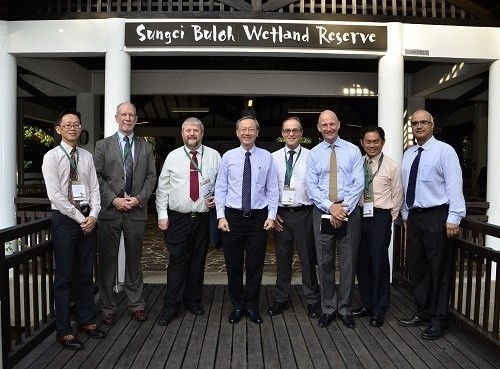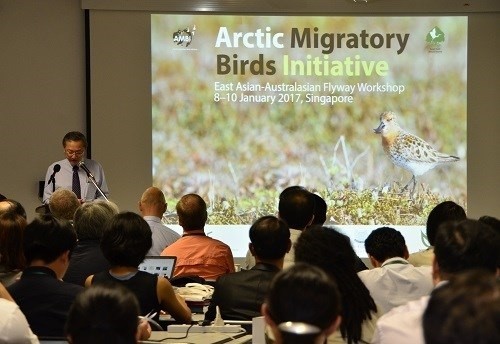14 Feb 2017
Minister of State in the Prime Minister’s Office and Ministry of Manpower Sam Tan today opened the Arctic Migratory Birds Initiative (AMBI) Workshop at the Sungei Buloh Wetland Reserve.
The AMBI Workshop is organised by the Arctic Council’s Conservation of Flora and Fauna (CAFF) working group, and is the first such Arctic Council meeting hosted in Singapore. Supported by MFA, the National Parks Board (NParks), and the Royal Norwegian Embassy in Singapore, the three-day Workshop brings together 80 participants from 20 countries to discuss the conservation of Arctic migratory birds along the East Asian-Australasian Flyway (EAAF).
MOS Tan’s speech is appended.
. . . . .
MINISTRY OF FOREIGN AFFAIRS
SINGAPORE
8 JANUARY 2017
______________________________________________________________________
REMARKS BY MINISTER OF STATE IN THE PRIME MINISTER’S OFFICE AND MINISTRY OF MANPOWER SAM TAN AT THE ARCTIC MIGRATORY BIRD INITIATIVE EAST ASIAN-AUSTRALASIAN FLYWAY WORKSHOP ON SUNDAY, 8 JANUARY 2017, 9.00AM AT THE SUNGEI BULOH WETLAND RESERVE
His Excellency Tormod Endresen, Ambassador of Norway to Singapore
Chair of the Arctic Council’s Conservation of Arctic Flora and Fauna Working Group, Mr Reidar Hindrum
Chair of the Arctic Migratory Birds Initiative, Mr Evgeny Syroechkovskiy
Distinguished speakers and guests
Ladies and Gentlemen
A very good morning to everyone. It is indeed a privilege and honour to join you here today for the very first workshop on Arctic migratory birds held in Southeast Asia. I am delighted to see the good turnout and appreciate that many of you have travelled from far away to be here. Your experiences and participation will help us create a better understanding of the challenges that face Arctic migratory birds and how to best conserve them. I am also happy to note that the East Asian-Australasian Flyway Partnership (EAAFP) is holding its 9th Meeting of Partners here in Singapore for the very first time following this workshop.
2 As many of you have seen, Singapore is highly urbanised and densely populated. In fact, a five-minute drive from Sungei Buloh Wetland Reserve will take you to one of the largest housing estates in Singapore. We are the second densest sovereign state in the world, just behind Monaco. As such, the challenge of integrating our urban areas with our natural spaces has become a necessity. Our forefathers had anticipated this challenge, and in 1967, our vision of a “garden city” was conceived. Since then, our vision has continued to evolve - from its humble beginnings in tree-planting, Singapore is now home to 350 parks and the first UNESCO World Heritage Site – the Singapore Botanic Gardens. However, providing these natural spaces alone is not enough and there is a need to educate the public on how to appreciate and preserve their natural spaces. To this end, we have implemented various initiatives and programmes to connect and engage different groups in the community to conserve Singapore’s natural heritage. These include activities such as the Garden Bird Watch and Heron Watch under the Community in Nature Initiative (CIN) which involve Singaporeans at large to collect information about birds in our parks, gardens and reserves. This is active citizenry at work, and every one of us can be active participants in contributing to the natural beauty and greenery that we have in Singapore today.
3 It is also appropriate that this workshop is held at the pristine Sungei Buloh Wetland Reserve, one of four nature reserves in Singapore. Since its opening in 1993, the Reserve has received high acclaim as Singapore’s very first ASEAN Heritage Park. It was also recognised by Wetlands International as an important shorebird conservation site and joins other sites such as Australia’s Kakadu National Park, China’s Mai Po-Inner Deep Bay and Japan’s Yatsu Tidal Flats in the East Asian Australasian Shorebird Site Network.
4 In fact, Sungei Buloh annually enjoys “winter holiday visits” by more than 2,000 Arctic migratory birds comprising more than 30 different species such as the Whimbrel, the Pacific Golden Plover and the Bar-tailed Godwit. Our National Parks Board (NParks) monitors these bird populations and shares this information with the Arctic Council’s Conservation of Arctic Flora and Fauna (CAFF) Working Group. In this way, even a country as geographically distant from the Arctic as Singapore can contribute to Arctic research and to the work of the Arctic Council in which we have been an observer since 2013. Co-hosting this workshop is a part of our contributions as an Arctic Council observer state.
5 Singapore recognises the importance of Arctic research in developing sustainable and effective solutions to Arctic challenges. Beyond sharing information with CAFF and our participation in several of the Arctic Council’s working groups, we have also sought to develop our Arctic research capabilities and infrastructure. For instance, under the Arctic Affairs Programme at the National University of Singapore (NUS), we co-fund various visits and seminars to enhance knowledge of Arctic shipping, and to help bring a conversation on the Arctic to the Southeast Asian region. This workshop today serves a similar purpose. The Arctic will also be one of the focus areas for the newly established $1.56 million Ocean’s Governance Research Programme, set up by the Maritime and Port Authority (MPA) and the NUS Centre for International Law (CIL). In August last year, I also had the pleasure of attending the “Energy Transitions and a Globalised Arctic: The Role of Science, Technology and Governance” conference organised by the NUS Energy Studies Institute (ESI) which examined issues such as remote access to energy and the role of research and development. As we approach Singapore’s fourth year as an Arctic Council observer, we will continue to explore new ways to contribute to the work of the Arctic Council.
6 In conclusion, I would like to thank the CAFF Secretariat and NParks for organising this workshop today and the Royal Norwegian Embassy for co-sponsoring this event. For a small country with limited resources, obtaining support for these initiatives have been invaluable. The Norwegian Embassy has been very helpful in this respect, and we look forward to more cooperation in the future. Indeed, international cooperation is imperative to conserve Arctic migratory birds, which are a rare and beautiful species. It is therefore heartening to see that many have responded to attend this workshop since it is through platforms such as these that we are able to exchange information, share experiences and consolidate our future plans for conservation. I wish you fruitful and constructive discussions ahead.
. . . . .

